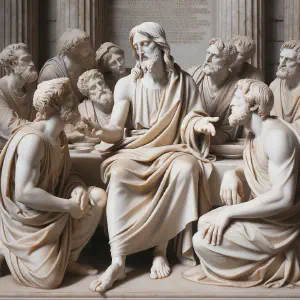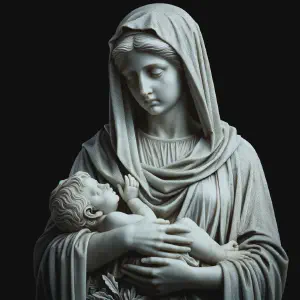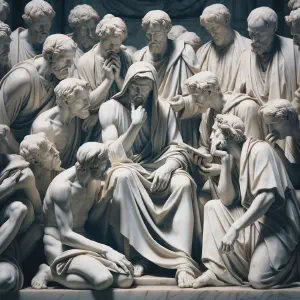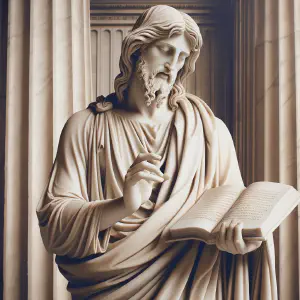The Banquet of Mercy



Back at Simon’s house, the guests pondered Jesus’ message. Some dismissed it as impractical idealism, but others, including Simon, felt a stirring in their hearts. They recognized the profound truth in Jesus’ words - that true generosity expects no repayment, and that the measure of a society lies in how it treats its most vulnerable members. This message, echoing the depth of God’s mercy and love, rippled through the city, inspiring acts of kindness and a newfound understanding of divine compassion.
Five Questions
What is the significance of Jesus’ instruction to invite the poor and marginalized to banquets in the story from Luke’s Gospel?
Jesus’ instruction to invite the poor and marginalized is a radical call to practice genuine compassion and hospitality. In a society where social status and reciprocity were highly valued, Jesus challenges these norms. He teaches that true generosity does not seek repayment or social advantage. Instead, it is an unconditional act of love, reflecting the nature of God’s mercy, which is given freely and abundantly to all, especially those in need.
How does the reading from Romans relate to the theme of mercy in the Gospel story?
In Romans, Paul speaks about the irrevocable nature of God’s gifts and call, emphasizing that God’s mercy is extended to all, even those who have disobeyed. This aligns with the Gospel message, where Jesus highlights that acts of kindness should be extended to those who cannot repay us. Both passages underscore the idea that God’s mercy is not limited by our actions or social standing, and we are called to mirror this divine mercy in our interactions with others.
Can you explain how the Psalm ties into the overall message of these readings?
Psalm 69 speaks to God’s attentiveness and love towards the poor and afflicted. It reinforces the theme that God hears and cares for those in need, resonating with Jesus’ message in the Gospel. The Psalmist’s expression of praise and thanksgiving to God, despite personal afflictions, also reflects the unconditional nature of God’s mercy and love, urging believers to maintain faith and hope in God’s salvation.
In the story, how does the character of Simon the Pharisee contribute to the message?
Simon the Pharisee represents a societal norm of his time, where social gatherings often reinforced status and reciprocity. By inviting Jesus, a respected teacher, Simon may have expected to enhance his own reputation. Jesus’ message at the banquet, however, presents a stark contrast to these societal expectations. Simon’s role in the story underscores the challenge Jesus poses to conventional practices and beliefs, inviting listeners to a deeper understanding and practice of genuine hospitality and compassion.
What practical lessons can modern-day Christians draw from these scriptures?
Modern-day Christians can draw several practical lessons from these scriptures. First, like Jesus, we are called to practice hospitality and generosity, especially towards those who are marginalized or unable to repay us. This reflects a selfless love that seeks the well-being of others. Second, recognizing the depth of God’s mercy towards us, as Paul highlights, should inspire us to extend mercy and forgiveness to others. Lastly, the scriptures encourage us to find strength and hope in God, especially in times of personal trials, as the Psalmist exemplifies, trusting in His unfailing love and salvation.
Bible Study
Rom 11:29-36
Brothers and sisters:
The gifts and the call of God are irrevocable.Just as you once disobeyed God
but have now received mercy
because of their disobedience,
so they have now disobeyed in order that,
by virtue of the mercy shown to you,
they too may now receive mercy.
For God delivered all to disobedience,
that he might have mercy upon all.Oh, the depth of the riches and wisdom and knowledge of God!
How inscrutable are his judgments and how unsearchable his ways!For who has known the mind of the Lord
or who has been his counselor?
Or who has given him anything
that he may be repaid?For from him and through him and for him are all things.
To God be glory forever. Amen.
In this passage, Apostle Paul, a key figure in early Christianity known for his missionary journeys and theological teachings, reflects on God’s unchanging promise and mercy. He highlights that God’s gifts and call are irrevocable, showing divine grace even in disobedience. This aligns with Catholic values of God’s enduring mercy and the belief in grace as a fundamental gift of God. The passage resonates with the Catholic understanding of God’s infinite wisdom and the mysterious nature of His plans, as reflected in the Catechism of the Catholic Church.
Ps 69:30-31, 33-34, 36
R. (14c) Lord, in your great love, answer me.
But I am afflicted and in pain;
let your saving help, O God, protect me.
I will praise the name of God in song,
and I will glorify him with thanksgiving.
R. Lord, in your great love, answer me.
“See, you lowly ones, and be glad;
you who seek God, may your hearts revive!
For the LORD hears the poor,
and his own who are in bonds he spurns not.”
R. Lord, in your great love, answer me.
For God will save Zion
and rebuild the cities of Judah.
They shall dwell in the land and own it,
and the descendants of his servants shall inherit it,
and those who love his name shall inhabit it.
R. Lord, in your great love, answer me.
This Psalm, attributed to King David, a central figure in Jewish and Christian traditions known for his leadership and poetic skills, expresses a plea for salvation amidst suffering. It emphasizes God’s special care for the poor and the oppressed, aligning with the Catholic Church’s emphasis on the Corporal Acts of Mercy. The psalmist’s trust in God despite afflictions mirrors Catholic teachings on the redemptive value of suffering and the importance of thanksgiving, as highlighted in Catholic catechesis.
Lk 14:12-14
On a sabbath Jesus went to dine
at the home of one of the leading Pharisees.
He said to the host who invited him,
“When you hold a lunch or a dinner,
do not invite your friends or your brothers or sisters
or your relatives or your wealthy neighbors,
in case they may invite you back and you have repayment.
Rather, when you hold a banquet,
invite the poor, the crippled, the lame, the blind;
blessed indeed will you be because of their inability to repay you.
For you will be repaid at the resurrection of the righteous.”
In Luke’s Gospel, Jesus, addressing a Pharisee, challenges social norms by urging the practice of inviting the marginalized to feasts. This directly reflects Catholic social teaching, emphasizing the preferential option for the poor and vulnerable. The message aligns with the Spiritual and Corporal Works of Mercy, advocating for selfless love and hospitality. Jesus’ teaching here is a call to humility and charity, foundational principles in Catholic ethics and mirrored in the Beatitudes and the Catechism’s teachings on social justice.
Lessons
These passages teach us the boundless nature of God’s mercy and the call to emulate His generosity and compassion in our lives. Through Paul’s letter to the Romans, we are reminded that God’s gifts and call are irrevocable, extending mercy to all. The Psalm reinforces the theme of God’s enduring love, particularly for the afflicted and the poor. In the Gospel, Jesus invites us to practice genuine generosity by serving those who cannot repay us, emphasizing the virtue of humility and selfless love. These teachings guide us to live a life that reflects the heart of Christ, where mercy, humility, and compassionate service form the cornerstone of our faith.
Meditation Prayer


